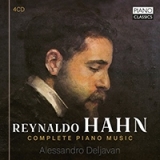Die Musik des französischen Komponisten Reynaldo Hahn (1874-1947) findet nur ganz selten den Weg auf die Konzertbühne oder ins Aufnahmestudio. Deshalb ist es Allessandro Deljavan sehr hoch anzurechnen, dass er sämtliche Klavierwerke Hahns eingespielt hat, dies allerdings schon 2013 und 2015. Piano Classics bringt nun diese Aufnahmen in einer Box mit vier CDs auf den Markt.
Deljavan beginnt mit dem späten und reifen Klavierzyklus Le Rossignol éperdu, der in vier Serien aufgeteilt ist und 160 Minuten dauert. Man kann nur von dem kompositorischen Können überrascht sein, denn hier widmet sich Hahn auf sehr überzeugende Weise der Ästhetik des Impressionismus, distanziert sich aber musikalisch von Debussys komplexer Klangsprache. Die früheren Werke, darunter auch das mit acht Jahren komponierte L’inspiration, ein Walzer, sind Geschmackssache. Sie sind eingängig, gefällig und oft typische Salonmusik.
Alessandro Deljavan gibt sich bei jedem Werk Mühe, dies im besten Licht erscheinen zu lassen, neigt aber regelmäßig zum Überinterpretieren. Auch besitzt der Pianist nicht die Fähigkeit, ein Werk wie eben Le Rossignol éperdu, durchgehend interessant und überzeugend zu gestalten. Hier gibt es dann regelmäßig Spannungsabfälle, was aber auch durch Hahns Kompositionstechnik begünstigt wird. Unter dem Strich bleibt somit eine ordentliche Gesamtaufnahme, die die Stärken des Komponisten Reynaldo Hahns bewusst in den Mittelpunkt stellt, seitens des Interpreten aber über nicht genug pianistisches Genie verfügt, um sie wirklich zu empfehlen.
The music of the French composer Reynaldo Hahn (1874-1947) rarely finds its way onto the concert stage or into the recording studio. Therefore, it is to Allessandro Deljavan’s credit that he has recorded all of Hahn’s piano works. He did it already in 2013 and 2015. Piano Classics now brings these recordings to the market in a four-CD box set.
Deljavan begins with the late and mature piano cycle Le Rossignol éperdu, which is divided into four series and lasts 160 minutes. One can only be surprised by the compositional skill, for here Hahn devotes himself in a very convincing way to the aesthetics of Impressionism, but distances himself musically from Debussy’s complex tonal language. The earlier works, including L’inspiration, a waltz composed when Hahn was eight, are a matter of taste. They are catchy, pleasing and often typical salon music.
Alessandro Deljavan takes pains with each work to make this appear in the best light, but regularly tends to overinterpret. Also, the pianist does not have the ability to make a work like Le Rossignol éperdu consistently interesting and convincing. Here, there are regular lapses in tension, which, however, is also favored by Hahn’s compositional technique. The bottom line is that this is a decent overall recording that deliberately focuses on the strengths of Reynaldo Hahn as a composer, but lacks enough pianistic genius on the part of the performer to really recommend it.






















